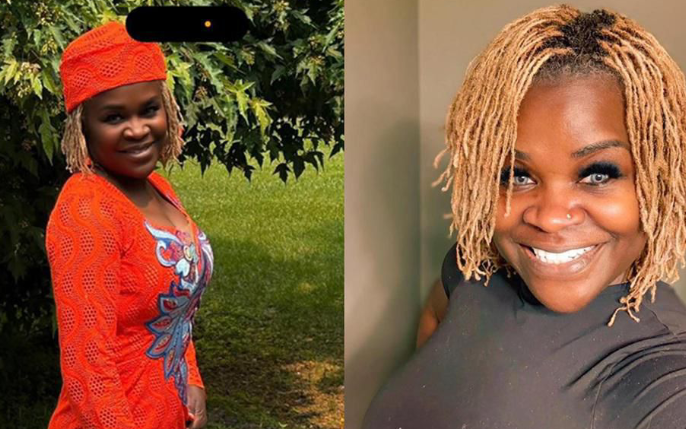
“Please Run!” – Linc Edochie’s Ex, Yinka, Sparks Fierce Debate with Candid Advice on Divorced Men

The online space was set ablaze today after Yinka Theisen, the ex-wife of Nollywood actor and filmmaker Linc Edochie, took to social media with a fiery warning directed at women about the risks of dating divorced men. In a post that quickly went viral, Yinka delivered her blunt message without hesitation, insisting that women should run the moment they meet a man who claims his former wife initiated a divorce and refused reconciliation. “Ladies, when you meet a divorced man and he tells you his ex-wife wanted the divorce and refused to reconcile, please run,” she wrote emphatically. “Don’t ask questions, just run. Don’t listen to lame excuses as to why.” The statement, though short, carried a force that sent shockwaves across social media platforms, igniting passionate debates on love, marriage, gender dynamics, and the often murky truths behind divorces.
Yinka’s words, laced with experience and perhaps unhealed wounds, come from a personal history that is no secret to the public. Her marriage to Linc Edochie, brother to Nollywood superstar Yul Edochie and son of veteran actor Pete Edochie, once seemed full of promise but ended in separation. While the details of their split have never been fully dissected in the media, Yinka’s new outburst appears to give hints at a deeper backstory, suggesting that she, like many women, has been through a painful journey that left her wary of men who shift blame for failed marriages onto their ex-wives. The bluntness of her advice left many wondering if her words were a thinly veiled reference to her own marital experience or simply a broader warning rooted in the wisdom of hindsight.
Social media, predictably, wasted no time in weighing in. Within hours of her post, her words became a trending topic, with thousands of users dissecting, debating, and sometimes mocking her stance. Some women praised her honesty, applauding her courage to speak what many have silently felt. They argued that often in relationships, men downplay their own role in marital breakdowns and paint themselves as innocent victims while demonizing their ex-partners. For these women, Yinka’s words were not just advice but a clarion call to stop romanticizing the idea of being a savior in a broken man’s story. Others, however, pushed back strongly, accusing her of bitterness and generalization. They argued that not every divorced man is guilty of wrongdoing, and that sometimes women walk away from marriages for reasons that have little to do with their husbands’ actions.
What makes Yinka’s outburst particularly newsworthy is its timing and the family it comes from. The Edochie family has long been one of Nollywood’s most respected dynasties, but in recent years, their name has frequently made headlines for reasons beyond cinema. From Yul Edochie’s controversial second marriage to the public discussions of morality, polygamy, and betrayal, the Edochie name has been entangled in debates about love and relationships in Nigerian society. Yinka’s sudden voice in the conversation adds yet another layer, showing that the turbulence within the extended family circle continues to ripple outward into public discourse.
Observers note that her words also reflect a growing cultural conversation about divorce, remarriage, and the caution many women are beginning to exercise in a society where marriage is highly valued but often plagued by secrecy, betrayal, and unspoken suffering. In many African cultures, divorced women have historically borne the brunt of societal stigma, while men often escape scrutiny and even remarry without facing much backlash. Yinka’s post seems to flip the script, casting suspicion on men who claim innocence in divorce stories and encouraging women to refuse to carry the burden of “fixing” someone else’s baggage.
Interestingly, some psychologists and relationship experts who joined the conversation on social media suggested that Yinka’s advice, though harsh, may hold a kernel of truth. They noted that individuals who consistently shift blame onto others without acknowledging their own role in a failed marriage may indeed pose a red flag for future relationships. A divorced man who insists he is entirely blameless could be avoiding accountability, which may lead to repeating the same patterns in his next relationship. But at the same time, experts cautioned that painting all divorced men with the same brush could be dangerous and unfair, as each marriage breakdown carries its own unique story.
As expected, a stream of men flooded the comment sections to challenge Yinka’s position. Some accused her of trying to project her personal pain onto others, while others argued that many men stay silent about the real reasons their wives left, often to protect their children or preserve dignity. One user wrote, “So because a man respects his ex-wife enough not to drag her name in public, he should be abandoned by women? This is unfair.” Another said, “Madam, not every man is your ex-husband. Some of us tried everything to keep our marriages, but some women simply wanted out. Should we now be punished forever for something out of our control?”
Yinka’s defenders, however, doubled down, sharing personal stories that resonated with her warning. Many women recounted tales of dating divorced men who initially seemed like victims of “wicked ex-wives” only to later discover patterns of manipulation, irresponsibility, or even abuse that explained why the ex-wife had left in the first place. “The truth is, men will never tell you the full story of their divorce,” one commenter insisted. “If a woman was willing to leave her marriage and never look back, trust me, there’s always more than meets the eye.”
The story also touches on the broader struggle of women navigating love and marriage in a digital age where social media has become the new court of public opinion. For some, Yinka’s post was a refreshing dose of reality, cutting through the glossy portrayals of romance to expose the dangers of ignoring red flags. For others, it was a bitter reminder of how personal grievances can spill into sweeping generalizations that unfairly stigmatize entire groups. Either way, it has sparked the kind of heated but necessary debate that forces society to confront uncomfortable truths.
In the end, Yinka’s statement may not provide a universal guide for all women, but it has undeniably struck a chord. Whether it was intended as a personal catharsis, a public warning, or a subtle jab at her own past, her words have reignited conversations about accountability, honesty, and caution in relationships. What remains clear is that in a society where divorce stories are often told from a single perspective, Yinka’s bold advice to “just run” has given women permission to question narratives more critically. Her message may be controversial, but it has ensured that once again, the Edochie name remains firmly in the spotlight, this time because of a woman who is refusing to stay silent about what she has learned.
As the dust continues to settle on her viral post, one thing is certain: whether people agree with her or not, Yinka Theisen has forced an entire generation of women to pause and reconsider the risks of entering relationships with divorced men who claim innocence. And in that pause lies the power of her message. Sometimes it only takes one raw, unfiltered statement to shift the way society looks at love, divorce, and the hidden truths in between.

